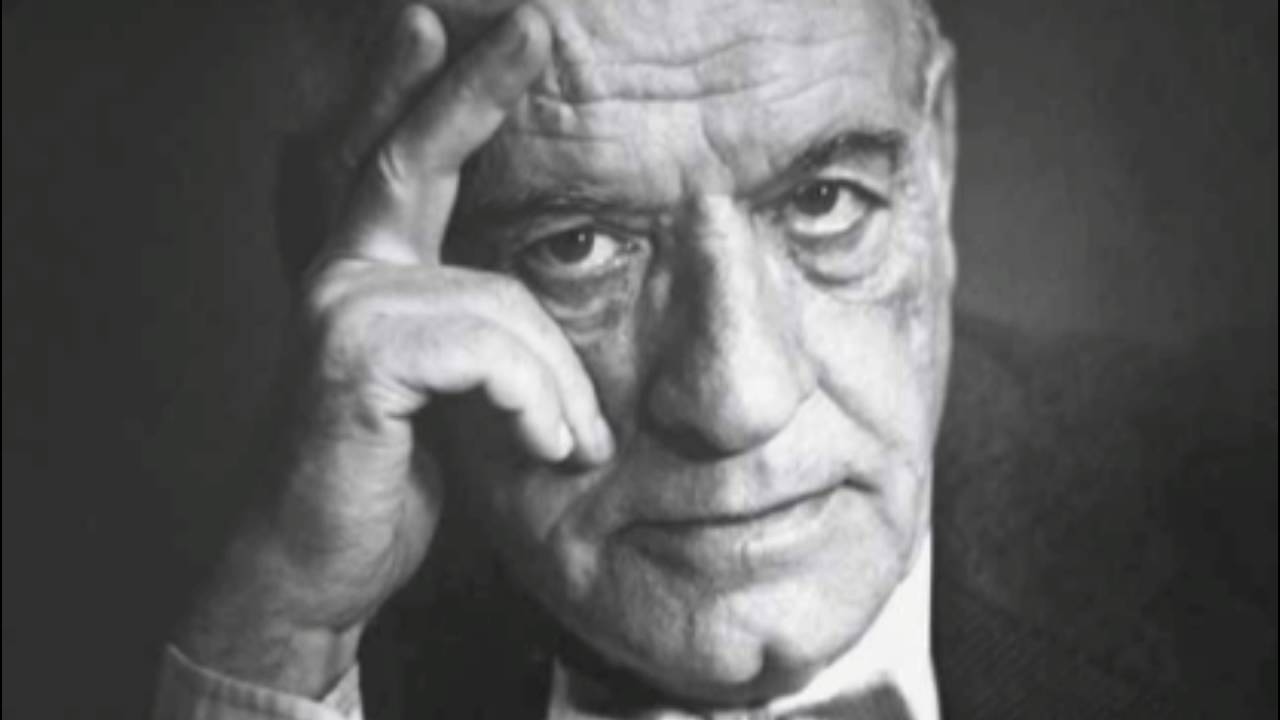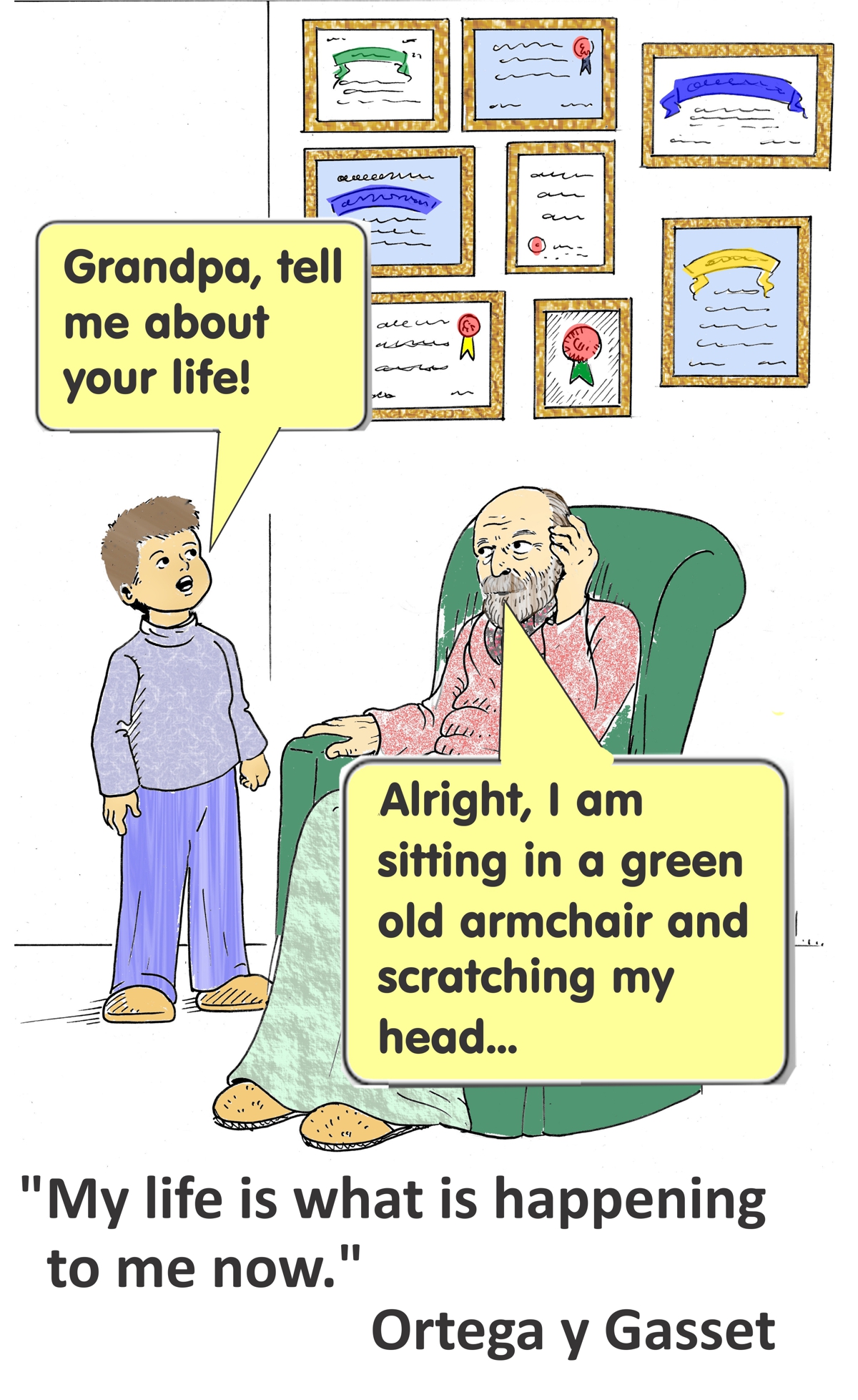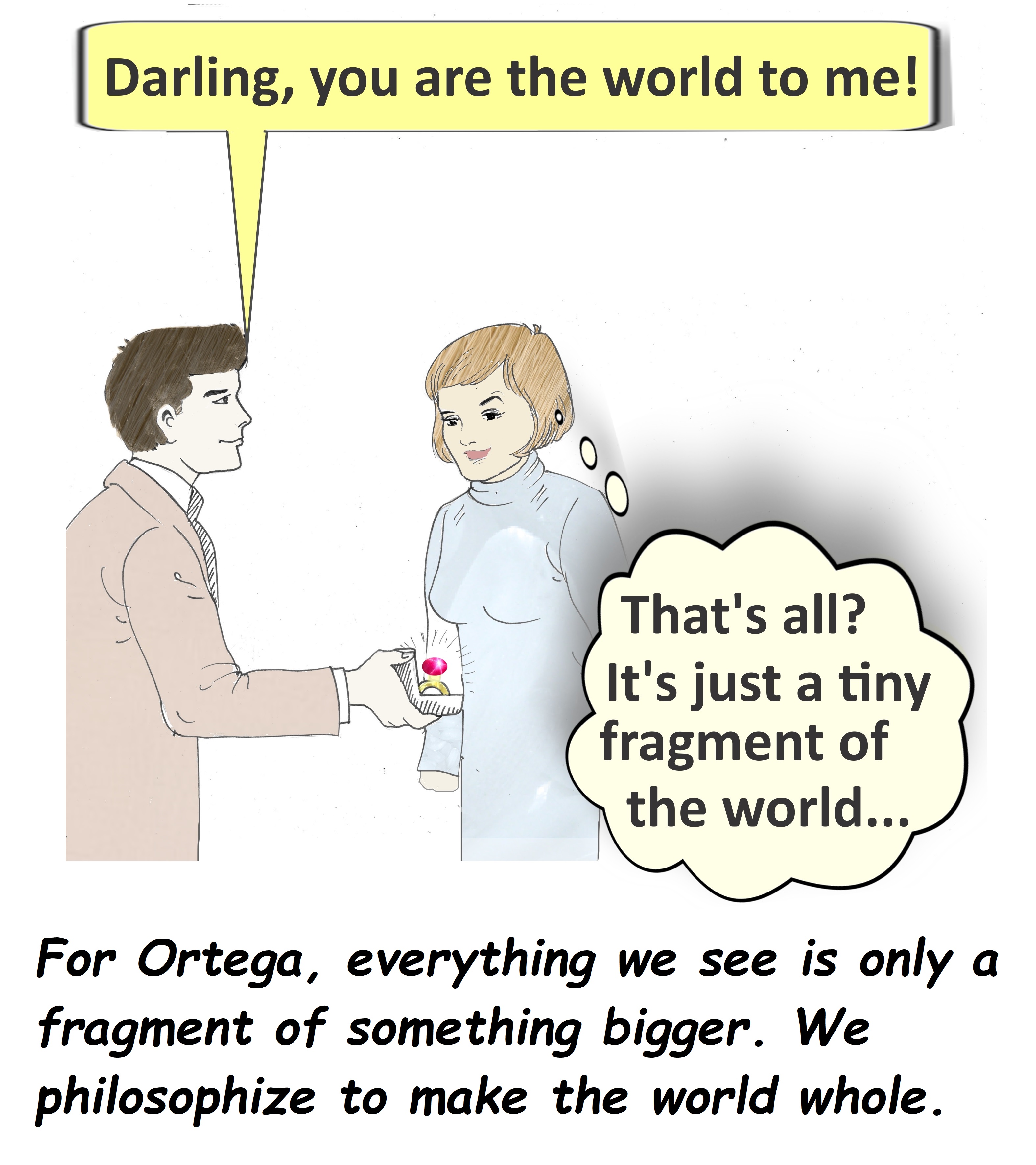LIST OF PHILOSOPHERS
THEMES ON THIS PAGE:
| 1. MY LIFE | 2. WHAT IS PHILOSOPHY? | 3. THE INNER SELF | |||
| 4. ROMANTIC LOVE | 5. THE OTHER PERSON | ||||
 José Ortega y Gasset (1883-1955) was a Spanish philosopher whose works influenced greatly 20th century Spanish thought. His philosophy, which unites existentialist, phenomenological, and pragmatist themes, attempts to relate to life as it is lived, instead of remote abstract ideas. Ortega was born in Madrid to an educated, liberal family that was actively involved in the world of newspapers. He received his doctorate in philosophy at Complutense University of Madrid, and a few years later became a professor at the same university. In 1917 he started publishing articles in the newspaper El Sol and continued doing so for many years – many of his articles were later published in his books. In 1929 he wrote a series of articles which was published in 1930 as the book The Revolt of the Masses. It was translated to several languages and made him famous. He became involved in politics and was briefly a parliament member. At the beginning of the Spanish Civil War he left Spain and went to exile in Argentina and then Portugal. Unlike many Spanish intellectuals who stayed away from Franco’s Spain, Ortega returned to Spain in 1942, where he founded the Institute of Humanities. He died at his home in Madrid at the age of 72.
José Ortega y Gasset (1883-1955) was a Spanish philosopher whose works influenced greatly 20th century Spanish thought. His philosophy, which unites existentialist, phenomenological, and pragmatist themes, attempts to relate to life as it is lived, instead of remote abstract ideas. Ortega was born in Madrid to an educated, liberal family that was actively involved in the world of newspapers. He received his doctorate in philosophy at Complutense University of Madrid, and a few years later became a professor at the same university. In 1917 he started publishing articles in the newspaper El Sol and continued doing so for many years – many of his articles were later published in his books. In 1929 he wrote a series of articles which was published in 1930 as the book The Revolt of the Masses. It was translated to several languages and made him famous. He became involved in politics and was briefly a parliament member. At the beginning of the Spanish Civil War he left Spain and went to exile in Argentina and then Portugal. Unlike many Spanish intellectuals who stayed away from Franco’s Spain, Ortega returned to Spain in 1942, where he founded the Institute of Humanities. He died at his home in Madrid at the age of 72.
|
TOPIC 1. MY LIFE |
 The following text is taken from Chapter 2 of Ortega’s book Some Lessons in Metaphysics. The book is based on a series of lectures which he gave at the University of Madrid, as chair of the philosophy department, in 1932-1933. In line with his philosophical approach, Ortega tries to understand life as it is lived, as opposed to abstract theories that are remote from everyday moments.
The following text is taken from Chapter 2 of Ortega’s book Some Lessons in Metaphysics. The book is based on a series of lectures which he gave at the University of Madrid, as chair of the philosophy department, in 1932-1933. In line with his philosophical approach, Ortega tries to understand life as it is lived, as opposed to abstract theories that are remote from everyday moments.
For Ortega, my life is not primarily my ideals and aspirations, my spiritual journey, my professional career, my success story – all these are very selected elements. My real life is made of small everyday moment, including eating breakfast or cleaning my room.
I don’t know whether or not what I call “my life” is important, but it does seem that, important or not, it was here before all the rest, including before God Himself. Because all the rest – including God – must be understood as given to me, and as being – for me – WITHIN my own life.
What, then, is life? Don’t search far away; don’t try to remember learned expressions of wisdom. The fundamental truths must be always at hand, because only this way are they fundamental. Those truths which you must go out to search for, are the ones that are found only in a single place – the particular, localized, provincial truths, the truths in a corner, not the basic ones. Life is what we are and what we do. It is, then, of all the things, the closest to each one of us. Put a hand on it, and it will let itself be grasped like a tamed bird.
If, when you came here a moment ago, someone had asked you where you were going, you would have said, “We are going to hear a lecture on metaphysics.” And here you are, listening to me. The fact has no importance. Nevertheless, it is what makes up your life. I am sorry for you, but truth forces me to say that your life consists of a thing of tiny importance. But if we are sincere, we will recognize that most of our existence is made up of similar insignificant matters. We go, we come, we do this or that, we think, we love or don’t love, and so on. From time to time, our lives suddenly seem to contain tension, as if rising, concentrating and becoming dense. It may be a great sorrow or a great desire that overcomes us, and we then say that things of great importance are happening to us. But note that in terms of our lives, this variety of emphasis, this experiencing or not experiencing something huge, doesn’t matter. Because the frantic and highest hour is part of life (and no more) just like the common activity of our habitual moments.
The result, then, is that in this inquiry into life’s pure essence, the first view we get of life appears to us as the sum of what we do, the sum of the activities which (so to speak) furnish it. Life is what we do and what happens to us.
[…] We will now find a series of definitions of life, each one conserves and deepens the previous ones. And so, the first definition we find is this: To live is what we do and what happens to us, from thinking or dreaming or worrying, to playing the stock market or winning battles. It is important to me that you recognize that this is not a joke, but a truth as banal as it is basic and unquestionable. I intend to talk to you not about things that are obscure and far away, but about your life itself, and I begin by saying that, at this moment, your life consists in listening to me. I am sure that you will resist this truth, but there is no alternative, because this listening to me is what you are doing now, and it is what now makes up your life. But life is always a “now,” and it consists of what “now” is. The past and the future of your life have reality only in the now, and this is thanks to the fact that you now remember your past or anticipate your future. In this sense, life is pure actuality – it is a point in the present which contains all our past and all our future.
[…] Very well, next time you will take more care about what you do, in other words about how you live. The purpose of these lessons is no other than to provoke each of you to take care of your life. Because you have only one life, and it is composed of a given number – a very limited number – of instants, of nows. And to use that number badly is to destroy it, to kill a bit of your life.
|
TOPIC 2. WHAT IS PHILOSOPHY? |
 The following text is from Ortega y Gasset’s book What is Philosopy? which is a series of university lectures that he gave in 1928-1929, and which was published only after his death. Despite the title, these were not introductory lectures to beginning students, but a deep investigation into the nature of philosophy, addressed to an audience with a philosophical background.
The following text is from Ortega y Gasset’s book What is Philosopy? which is a series of university lectures that he gave in 1928-1929, and which was published only after his death. Despite the title, these were not introductory lectures to beginning students, but a deep investigation into the nature of philosophy, addressed to an audience with a philosophical background.
In this chapter Ortega explains that we philosophize because we realize that everything we know is only a fragment of reality, and we yearn for a complete world.
FROM CHAPTER 5
Philosophy does not appear for reasons of utility, but neither does it flourish out of caprice. It is by nature necessary to the intellect. Why? Its purpose was to seek all the things as such, to hunt the Unicorn, to capture the Universe. But why that eagerness? Why not be content without philosophizing, with what we find in the world, with what already is, what stands there clear before us?
Because of this simple reason: All that there is, over there in front of us, given to us, present and clear, is in its very essence a mere piece, a bit, a fragment, the stump of something absent. And we cannot see it without sensing and missing the part that is not there. In every given being, every datum of the world, we find its essential fracture line, we see that it is a part and only a part. We see the scar of its ontological mutilation, its pain of the amputated cries out at us, its nostalgia for the piece that is lacking, its divine discontent. Some years ago, speaking in Buenos Aires, I defined discontent as “like loving without being loved, like a pain we feel in parts we do not have.” It is the missing of what we are not, the recognition of ourselves as crippled and incomplete.
Strictly speaking, what I want to say is as follows: If we take any of the objects we find in the world, and focus on what we have when we hold it in front of us, we will very soon realize that it is only a fragment. It forces us to think about something else which would complete it.
[…]
And in fact, whenever we see something, this something is presented against a hidden background – obscure, enormous, undefined in its contours – which is simply the world, the world of which it is a part, the world of which it is a piece. What we see is always only the visible tip which is moved toward us by the hidden rest of the world. And so, we can raise this observation to the status of a general law and say that when a thing is present, the world is always com-present, always included in it.
[…]
Well then, the world (in the sense we are now giving this word) is only the collection of things we can continue seeing one after the other. Those things which we do not see act as background for the things we do see, but later the others will be before us, immediate, clear, and given to us. And if each one is only a fragment and the world is no more than a collection of these fragments, this means that the entire world – the combination of what is given us, which we can call “our world” – will also be a fragment, enormous, huge, but a fragment and nothing more. The world does not explain itself even to itself. On the contrary, when we find ourselves theoretically facing it, what is given to us is only… a problem.
[…]
Similarly, the world which we find exists, but at the same time it is not sufficient in itself, it does not support its own being, it cries out about what it lacks, it declares its non-being and forces us to philosophize. Because this is what philosophizing is: Seeking to give the world its integrity, completing it as a Universe, and out of the part constructing for it a whole where it can reside and rest.
|
TOPIC 3. THE INNER SELF |
 In 1940, Ortega announced that he was working on a book about philosophy of society. He later worked on this topic through several lectures in Europe and Argentina, and in 1949-1950 gave a university course on this topic at the Institute for the Humanities in Madrid. This served as the basis of his book Man and People, published after his death, in 1957. The book starts with a discussion of the self, then the world, the encounter with the other person, the general public and the social.
In 1940, Ortega announced that he was working on a book about philosophy of society. He later worked on this topic through several lectures in Europe and Argentina, and in 1949-1950 gave a university course on this topic at the Institute for the Humanities in Madrid. This served as the basis of his book Man and People, published after his death, in 1957. The book starts with a discussion of the self, then the world, the encounter with the other person, the general public and the social.
The following text is taken (with slight adaptations) from the beginning of the book, Chapter 1. Here he argues that action – in the real sense of the word – means acting from within yourself. It therefore requires that you have an inner self into which you can enter from time to time. Interestingly, the idea of within myself versus outside myself is an important theme in Ortega’s philosophy which he uses in his discussions on various issues.
There is no better place than the zoo, before the cages of our cousins the monkeys, to realize that the possibility of meditation is man’s essential attribute. […] The little animals are constantly on the alert, always uneasy, looking and listening for all the signals that reach them from their surroundings, forever attentive to their environment as if they feared some constant danger from it […] The animal does not rule its life, it does not live from ITSELF, but always attends to what is happening outside it, to what is OTHER than itself. […] The animal is always estranged from itself, beside itself. Its life is essential alteración – being possessed by all that is OTHER.
[…]
But, you will ask, doesn’t man find himself in the same situation as the animal, a prisoner of the world, surrounded by things that terrify him, by things that enchant him, and he is forced to concern himself with them all his life, whether he wants it or not? Certainly, but with this essential difference: that man can, from time to time, suspend his direct concern with things, detach himself from his surroundings, ignore them, and while radically shifting his faculty of attention, turn his back on the world and take his stand inside himself. He can attend to his own inwardness, or, what is the same thing, concern himself with himself and not with what is OTHER, with things.
We are used to calling this operation “thinking,” “meditation,” “contemplation” – words which are over-used like old coins, and can no longer express their meaning with any force. But these expressions hide the most surprising thing: man’s power to withdraw himself from the world, virtually and temporarily, and take his stand inside himself. Or, to use a magnificent word which exists only in Spanish, man can ENISIMISMARSE [“be inside himself”].
Note that this marvelous faculty of man, of temporarily freeing himself from his slavery to things, implies two very different powers: One is his ability to ignore the world for a longer or shorter time without fatal risk. The other is that he has a place where he can take his stand, a place to be, when he has virtually left the world. [..] But the world is the whole of exteriority, the absolute OUTSIDE, which can have no other “outside” beyond itself. The only possible outside to this “outside” is precisely an INSIDE, the inwardness of man, his SELF, which is made mainly of ideas.
Because ideas possess the most extraordinary condition of being nowhere in the world, of being outside all places; although symbolically we situate them in our heads.
[…]
Of course, these two things – man’s power to withdraw himself from the world, and his power to take his stand within himself – are not gifts that are given to him. I must emphasize this for those of you who are concerned with philosophy: they are not gifts given to man. Nothing that is substantive has been given to man. He has to do everything by himself. Hence, if man enjoys this privilege of temporarily freeing himself from things and entering into himself and resting there, it is because by his effort, his work, and his ideas he has succeeded to react to things, to transform them, and to create for himself a margin of security, which is always limited, but always or almost always increasing. This specifically human creation is technology. Thanks to it, and in proportion to its progress, man can take his stand within himself. But, vice versa, man is a technician, he is also able to modify his environment in the direction of convenience.
[…]
There are, then, three different moments, which repeat cyclically throughout human history in more and more complex and rich forms: (1) Man feels himself lost, shipwrecked among things. This is alteración (possessed by otherness). (2) Man, by an energetic effort, withdraws into himself to form ideas about things and possible ways of dominating them. This is being within one’s self, ensimismamiento, the “vita contemplative” of the Romans, the “theoreticos bios” of the Greeks, theory. (3) Man again submerges himself in the world, to act according to his prepared plan. This is action, vita active, praxis. Accordingly, it is impossible to speak about action except when it is governed by a previous contemplation. And vice versa, contemplation, or being within one’s self, is nothing but a projection of future action.
When you subscribe to the blog, we will send you an e-mail when there are new updates on the site so you wouldn't miss them.
